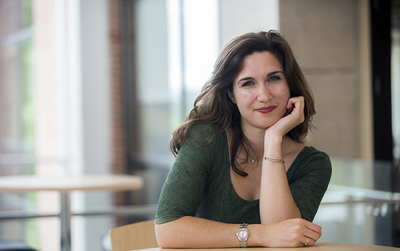
NSF fellow studies acute social stress
Even before arriving at Binghamton University, Katherine Frost began work on her doctoral research into schizophrenia. There’s already general agreement that anhedonia — an inability to experience pleasure — is an important part of schizophrenia, and that anhedonia may result from a breakdown in the brain’s reward system. Frost hypothesizes that increased social stress may contribute to that breakdown. If she’s right, her work could lead to a new model for a range of mental illnesses.
“The implications are profound,” says Assistant Professor Greg Strauss, who directs the university’s Translational Affective Neuroscience Laboratory, where Frost is pursuing her dissertation. “We’re basically stuck in terms of the treatment of anhedonia, largely because the underlying cognitive and neural basis is unknown. This is a novel framework for testing the effects of stress on the brain’s reward system, one we haven’t studied before, and Katherine has a rare combination of drive and intelligence to see it through.”
Since graduating from Wellesley College in 2010, Frost has published three peer-reviewed abstracts and three peer-reviewed papers, with another manuscript currently under review and two others in preparation. She has presented 11 posters, mostly based on her work at Harvard University’s Social Neuroscience and Psychopathology Lab, McLean Psychiatric Hospital and Boston Children’s Hospital.
She has begun thesis research into the effects of acute social stress on reward processing, starting with adults without psychiatric diagnoses, then progressing to adults with schizophrenia and then to children and adolescents at risk of developing schizophrenia. Most prestigious of all, she received a highly competitive 2015 Graduate Research Fellowship from the National Science Foundation, which covers three years of graduate school tuition, money for dissertation research, worldwide opportunities in professional development, funding for travel and access to an NSF supercomputer.
“When I saw that I’d gotten the fellowship, I was so excited, I danced around my room,” says Frost, who worked long distance with Strauss to draft the grant application during the summer of 2014. “This is an incredible next step for me, being able to pursue this research that I fell in love with so young. Studying schizophrenia, you never know what you’re going to see, because it’s such a heterogeneous disorder.
“I’m a very curious person, and I’ve always been fascinated by the way the brain works,” she continues. “There are so many opportunities to cover unknown territory. And I’ve always been extremely driven. Driven to achieve, driven to learn, driven to help people. This just fits right in.”







